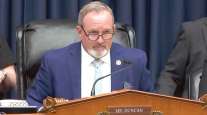Obama: Fixing Roads, Bridges Will Be a Second-Term Priority
This story appears in the Feb. 18 print edition of Transport Topics.
WASHINGTON — Infrastructure funding was in the spotlight last week on Capitol Hill, both in President Obama’s State of the Union speech and at a congressional hearing. There was agreement the United States must place a larger emphasis on funding, but specific details remained scarce.
In his Feb. 12 speech to a joint session of Congress, the first of his second term, Obama spoke of overhauling infrastructure and proposed seeking private investment to help fund improvements.
“Tonight, I propose a ‘Fix-It-First’ program to put people to work as soon as possible on our most urgent repairs, like the nearly 70,000 structurally deficient bridges across the country,” Obama said.
Though Obama has often spoken of the need for additional infrastructure funding, last week’s speech leaned more heavily on repairs than new construction.
“We’ll put more Americans to work repairing crumbling roads and bridges. We’ll make sure this is fully paid for, attract private investment and pick projects based [on] what’s best for the economy, not politicians,” he said, adding that it would not add to the budget deficit.
The next day, Rep. Bill Shuster (R-Pa.), chairman of the Transportation and Infrastructure Committee, presided over his first hearing as chairman and pledged to maintain the government’s role in infrastructure funding.
“An efficient national transportation network allows business to lower costs, which lowers production costs and enhances our productivity and profits,” Shuster said at the Feb. 13 hearing. “It allows American businesses to compete in a global marketplace and allows our economy to prosper and grow.”
American Trucking Associations spokesman Sean McNally said the federation was encouraged by last week’s discussions.
“We look forward to working with [Obama] and his administration to find the resources to address these issues within a reformed surface transportation program,” McNally said. He added it was “refreshing” to hear serious talk about raising the federal fuel tax.
Before the hearing took place, Shuster said he was unmoved by the president’s “Fix-It-First” idea during an event at the U.S. Chamber of Commerce.
“It was a retread,” Shuster said. “There wasn’t much there.”
As for attracting private investment, Shuster was optimistic. “Sure, let’s see what he’s talking about,” he told Transport Topics.
Chamber President Tom Donohue said that rebuilding roads and bridges would come at a great cost.
“Improving our infrastructure will involve significant cost, but if we don’t act, the cost is going to be even higher and more difficult to meet,” Donohue said.
Donohue cited a recent report from the American Society of Civil Engineers estimating that, if the country does nothing, the infrastructure will need $1.2 trillion of repairs by 2020.
He encouraged lawmakers to raise the federal fuel tax to pay for infrastructure because the current tax of 24.4 cents per gallon on diesel and 18.4 cents on gasoline cannot meet the country’s needs.
The business community is “willing to provide the one thing this problem needs most: money,” Donohue said, asking for “a modest” increase in gas and diesel taxes “over a number of years, and then indexing it to inflation.”
Last week, William Logue, president of FedEx Corp.’s less-than-truckload unit, FedEx Freight, told TT that he favors raising the federal fuel tax.
“It is the best way to put the money to work,” he said.
Logue also endorsed indexing the tax to the inflation rate, “So it doesn’t go backwards over time.”
Shuster also raised other funding options, such as charging motorists for how much they drive. All options are on the table, he said, adding, “I won’t rule anything in, I won’t rule anything out.
He might push to allow states to toll existing interstate highways, and he might want to encourage public-private partnerships, in which private companies invest in infrastructure.
Also at the congressional hearing was former Pennsylvania Gov. Ed Rendell (D), who agreed with Shuster’s openness to exploring a range of funding options.
“We can’t be an exceptional country without a first-class infrastructure,” said Rendell, who is co-chairman of Building America’s Future, a group of current and former politicians pushing for infrastructure spending. “And let the record show, we don’t have it anymore.”
The day after his speech, Obama toured a truck-parts plant in Asheville, N.C., as part of a three-day tour to promote initiatives including a lower tax rate for manufacturers.
“I believe in manufacturing,” Obama said at the Linamar Corp. plant, which makes engine blocks and wheel axles for mining trucks. “I think it makes our country stronger.”
During the speech, Obama also touted natural gas, saying that the “boom has led to cleaner power and greater energy independence.”
He proposed using some oil and gas revenue to fund an Energy Security Trust to “drive new research and technology to shift our cars and trucks off oil for good.”




